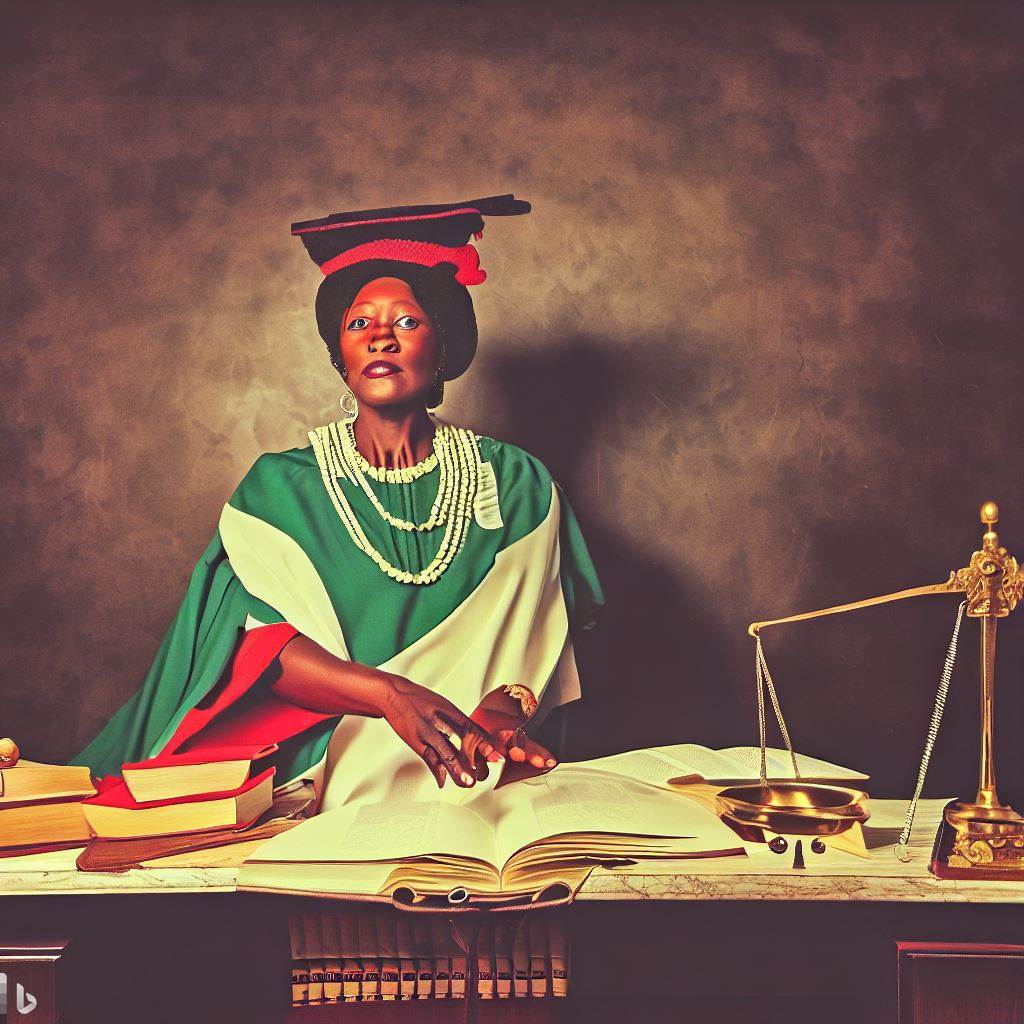Introduction
Litigation and dispute resolution play a crucial role in Nigeria’s entertainment sector, ensuring a fair and just industry.
The entertainment industry in Nigeria is flourishing, with artists, musicians, filmmakers, and actors contributing to the country’s cultural and economic growth.
However, with such growth comes the inevitable occurrence of disputes and conflicts.
Litigation and dispute resolution are vital in ensuring the smooth functioning and development of the entertainment sector.
They provide a structured and legal framework for resolving conflicts, protecting the rights of all parties involved, and maintaining the industry’s integrity.
In Nigeria, where creative talents are abundant, disputes frequently arise over copyright infringement, contract breaches, intellectual property theft, and royalty disputes.
These conflicts can threaten the financial stability and reputation of individuals and organizations within the entertainment sector.
Litigation and dispute resolution mechanisms, such as arbitration and mediation, offer a timely and efficient way to address these challenges.
By providing a neutral platform for communication and negotiation, they bring together parties in a safe and controlled environment, encouraging them to reach mutually beneficial outcomes.
Furthermore, the resolution of disputes through litigation not only ensures fair compensation for the aggrieved party but also sets legal precedents that serve as guidelines for future disputes.
This helps to create a transparent and reliable legal system that fosters trust and encourages investment in the entertainment industry.
Basically, litigation and dispute resolution are crucial in Nigeria’s entertainment sector, safeguarding the rights of artists and industry stakeholders, promoting creativity, and ensuring a vibrant and sustainable industry.
Overview of Nigeria’s Entertainment Sector
Nigeria’s entertainment sector has experienced significant growth and has become a vital part of the country’s economy.
The sector comprises various forms of entertainment, including music, film, television, comedy, and the arts.
Nigeria’s entertainment industry has gained international recognition and has become a major player in the global entertainment market.
It has a rich cultural heritage that influences its entertainment offerings and attracts both local and international audiences.
Description of the Growth and Significance of Nigeria’s Entertainment Industry
The growth of Nigeria’s entertainment industry can be attributed to several factors, including technological advancements and talent abundance.
The advent of social media platforms and digital streaming services has facilitated the dissemination of Nigerian content to a global audience.
Nollywood, Nigeria’s film industry, is the second-largest film producer globally, contributing significantly to the industry’s growth.
The entertainment industry is a major source of employment and revenue generation, contributing to the country’s GDP.
Additionally, Nigeria’s entertainment sector has created opportunities for cultural exchange and promotes national identity and unity.
Key Players and Stakeholders Involved in the Sector
Various key players and stakeholders contribute to the success and development of Nigeria’s entertainment sector.
- Artists and Creatives: Nigerian musicians, actors, comedians, and artists play a crucial role in driving the industry’s growth.
- Production Companies: These companies facilitate the creation and distribution of entertainment content.
- Streaming Platforms: Digital platforms like Netflix, YouTube, and Apple Music have contributed to the industry’s global reach.
- Regulatory Agencies: Organizations such as the National Film and Video Censors Board regulate and support the industry.
- Investors: Private and institutional investors provide funding and resources for the development of the sector.
Moreover, the audience and consumers play a vital role in the success of Nigeria’s entertainment sector by supporting and consuming the content.
Nigeria’s entertainment sector has witnessed remarkable growth, contributing to the country’s economic development and global cultural influence.
The industry’s key players, stakeholders, and the support of both local and international audience contribute to its success.
As the sector continues to evolve, it is essential to address challenges such as piracy and intellectual property rights to sustain its growth and protect the interests of all involved parties.
Overall, Nigeria’s entertainment sector has proven to be a vibrant and dynamic industry with immense potential for further growth and global recognition.
Read: Protecting Creatives: Legal Rights in Nigeria’s Entertainment Industry
Understanding Litigation in Nigeria’s Entertainment Sector
What litigation entails in the context of the entertainment industry
Litigation is a vital aspect of Nigeria’s entertainment sector, encompassing legal actions and disputes resolution processes within the industry.
In the context of the entertainment industry, litigation involves the initiation of legal proceedings to resolve disputes, conflicts, or infringements of rights.
Types of legal disputes commonly faced by individuals and organizations in the sector
Various types of legal disputes are commonly faced by individuals and organizations operating in Nigeria’s entertainment sector.
- Contractual Disputes: Artists, producers, and record labels often engage in contractual disputes, primarily related to compensation, royalties, and distribution rights.
- Copyright Infringement: Intellectual property theft, unauthorized use of copyrighted material, and plagiarism are common legal issues within the entertainment industry.
- Defamation: False statements, libel, slander, and reputational damage claims can arise from the highly publicized nature of the entertainment sector.
- Breach of Privacy: Invasion of privacy, unauthorized use of personal information, and leaked private content are potential grounds for legal action.
- Employment Disputes: Disagreements over work conditions, unfair treatment, wage disputes, and breaches of employment contracts can lead to litigation.
Importance of seeking legal recourse through litigation
Seeking legal recourse through litigation is crucial in Nigeria’s entertainment sector for several reasons.
- Protection of Rights: Litigation offers a platform to protect artists’ intellectual property rights and enforce contractual obligations.
- Resolution of Disputes: Legal proceedings provide a structured process for resolving conflicts and disputes between parties.
- Preserving Reputation: Litigation allows individuals and organizations to restore their reputation and seek compensation for reputational damage.
- Deterrence: Involvement in litigation serves as a deterrent to potential infringers, discouraging future violations within the entertainment industry.
- Precedent Setting: Landmark judgments and decisions resulting from litigation cases establish legal precedents, guiding future industry practices.
Generally, litigation in Nigeria’s entertainment sector plays a pivotal role in resolving legal disputes and safeguarding the industry’s integrity.
Through litigation, artists, producers, and organizations can protect their rights, resolve conflicts, and set legal precedents.
It is crucial for individuals and organizations involved in the entertainment sector to understand the importance of seeking legal recourse through litigation.
Read: Essential Legal Advice for Nigerian Artists and Their Managers
Dispute Resolution Mechanisms in Nigeria’s Entertainment Sector
The entertainment industry in Nigeria is vibrant and fast-growing, but with growth comes a rise in disputes and conflicts.
As such, it is crucial to have effective mechanisms for resolving these disputes in a timely and fair manner.
Alternative dispute resolution methods available in the industry
In this section, we will discuss the alternative dispute resolution methods available in the industry, namely negotiation, mediation, and arbitration.
1. Negotiation
- Negotiation is the most common and initial form of dispute resolution in the entertainment sector.
- It involves parties engaged in a dialogue to reach a mutually acceptable agreement.
- Advantages of negotiation include cost-effectiveness, flexibility, and preserving relationships between parties.
- However, negotiation may not be suitable for complex disputes where power imbalances exist.
2. Mediation
- Mediation is a voluntary and confidential process where a neutral third party assists the disputing parties.
- The mediator helps identify common ground, facilitates communication, and suggests possible solutions.
- It offers advantages such as speed, flexibility, and the opportunity for creative problem-solving.
- On the other hand, mediation relies heavily on the willingness of parties to participate in good faith.
3. Arbitration
- Arbitration is a more formal dispute resolution mechanism often used in the entertainment sector.
- The process involves submitting the dispute to a neutral third party or panel for a binding decision.
- Arbitration offers advantages such as expertise of arbitrators, confidentiality, and finality of outcomes.
- However, arbitration can be costly, time-consuming, and limited in terms of the available appeal options.
Which Mechanism to Choose?
Deciding on the best dispute resolution mechanism depends on various factors, including the nature of the dispute, the parties involved, and the desired outcome.
In some cases, a combination of methods may be used, starting with negotiation and escalating to mediation or arbitration if necessary.
In the Nigerian entertainment sector, negotiation often serves as a starting point for resolving disputes due to its flexibility and cost-effectiveness.
However, complex or high-stakes disputes may require the involvement of professional mediators or arbitrators who specialize in entertainment industry matters.
Regardless of the chosen method, the key is to ensure that the dispute resolution process is fair, impartial, and conducted by trained professionals who understand the intricacies of the entertainment sector.
This helps to maintain the industry’s reputation and foster a climate of trust and collaboration among stakeholders.
The entertainment industry in Nigeria thrives on creativity, talent, and collaboration. However, disputes and conflicts are inevitable.
By utilizing effective dispute resolution mechanisms like negotiation, mediation, and arbitration, stakeholders in the industry can address their differences and find mutually beneficial solutions.
It is crucial for all parties involved to be aware of these mechanisms and consider seeking professional assistance when necessary.
This will contribute to the overall growth and sustainability of Nigeria’s entertainment sector.
Read: How to Become an Entertainment Lawyer in Nigeria

Challenges of Litigation and Dispute Resolution in Nigeria’s Entertainment Sector
The entertainment industry in Nigeria is vibrant and dynamic, but it also faces numerous challenges when it comes to litigation and dispute resolution.
These challenges have a significant impact on the industry’s growth and development.
- Inadequate legal framework: The entertainment sector in Nigeria lacks a comprehensive legal framework to regulate its activities and resolve disputes effectively. This results in ambiguity and uncertainty.
- Complexity of intellectual property: Intellectual property rights are crucial in the entertainment industry, but they are often difficult to protect and enforce in Nigeria. Copyright infringement and piracy issues are widespread.
- Lack of specialized courts: Nigeria’s legal system does not have specialized courts to handle entertainment-related cases. This leads to delays, backlogs, and inefficiencies in resolving disputes.
- High litigation costs: Legal proceedings in Nigeria can be costly and time-consuming. The high costs of litigation often deter small players in the entertainment industry from seeking legal redress.
- Corruption and bribery: Corruption is a significant challenge in Nigeria’s legal system, and the entertainment sector is not exempt. Bribery and influence-peddling can impede fair resolution of disputes.
Analysis of the Specific Challenges Faced by the Industry
The entertainment industry in Nigeria faces specific challenges that further complicate the litigation and dispute resolution process.
- Lack of industry expertise: Many legal practitioners in Nigeria lack the necessary expertise and understanding of the unique issues in the entertainment sector. This hinders the effective handling of entertainment-related cases.
- Complex contractual disputes: Contracts are the backbone of the entertainment industry, but disputes frequently arise due to vague terms, breaches of contract, and disagreements over royalties and intellectual property ownership.
- Traditional dispute resolution mechanisms: In some cases, parties in the entertainment sector may resort to traditional dispute resolution mechanisms, such as community leaders or religious leaders.
However, these mechanisms often lack enforceability and may not provide fair and impartial judgment.
Influence of Cultural, Social, and Economic Factors
Cultural, social, and economic factors play a significant role in shaping the challenges faced by litigation and dispute resolution in Nigeria’s entertainment sector.
- Cultural attitudes towards litigation: In Nigeria, there is a prevailing cultural belief that disputes should be resolved through informal means rather than formal litigation.
This can hinder access to justice for the entertainment industry. - Power dynamics in the industry: The entertainment sector in Nigeria is heavily influenced by power dynamics and personal relationships.
Disputes often arise from conflicts of interest and the abuse of power, making resolution more challenging. - Economic disparities: Economic disparities within the entertainment industry can lead to exploitative practices and disputes over revenue sharing.
These disputes are often complex and require an efficient and fair legal system to resolve.
Inadequacy and Inefficiency of the Legal System in Handling Entertainment-related Cases
The inadequacy and inefficiency of Nigeria’s legal system present significant challenges to the effective resolution of entertainment-related cases.
- Backlog of cases: The Nigerian legal system is overwhelmed with a backlog of cases, which results in delays and prolonged litigation processes.
- Outdated laws: Many of the laws governing intellectual property and entertainment in Nigeria are outdated and do not address the contemporary challenges of the industry.
- Lack of judicial training: Proper training and specialization of judges in entertainment law is limited in Nigeria. This affects the quality of judgments and the ability to handle complex disputes.
- Insufficient resources: The legal system in Nigeria lacks adequate resources, including courtrooms, personnel, and technology, to effectively handle the growing number of entertainment-related cases.
In essence, the challenges faced by litigation and dispute resolution in Nigeria’s entertainment sector are multi-faceted.
From inadequate legal frameworks to cultural attitudes towards litigation, these challenges hinder the growth and development of the industry.
Addressing these challenges requires comprehensive legal reforms and specialized courts to provide timely and effective resolution of disputes.
Read: Entertainment Law and IP Rights: What Every Nigerian Artist Should Know
Importance of Expert Legal Representation
Why legal representation is crucial in entertainment-related disputes
When it comes to litigation and dispute resolution in Nigeria’s entertainment sector, expert legal representation plays a crucial role.
In entertainment-related disputes, having a skilled lawyer by your side is not just important but necessary.
Legal representation is crucial in the entertainment sector for several reasons.
Firstly, the industry is complex, with various legal issues that can arise, such as copyright infringement, contract disputes, or intellectual property theft.
These disputes require specialized knowledge and experience to navigate effectively.
Engaging expert legal representation ensures that your interests are protected and your rights are upheld throughout the dispute resolution process.
These lawyers understand the intricacies of the entertainment sector and can provide tailored advice and strategies to achieve the best possible outcome.
Benefits of seeking specialized lawyers with experience in the sector
Seeking specialized lawyers with experience in the entertainment sector also brings numerous benefits.
These lawyers have a deep understanding of the industry’s unique challenges, dynamics, and legal frameworks.
They know the relevant laws and regulations, as well as industry-specific practices and standards.
This allows them to provide targeted advice and identify potential risks and opportunities.
Furthermore, specialized lawyers have established networks within the entertainment industry.
They have connections with key players such as agents, publishers, production companies, and distributors.
These networks can prove invaluable in resolving disputes and reaching favorable settlements or agreements.
The relationships built over time can also facilitate efficient negotiations and provide access to resources and opportunities.
Examples of successful outcomes resulting from expert legal representation
Let’s look at some examples of successful outcomes resulting from expert legal representation in Nigeria’s entertainment sector.
In a copyright infringement case, a renowned music producer represented by a specialized lawyer successfully sued a famous artist for unauthorized use of his beat.
The court awarded substantial damages, recognizing the producer’s rights and creativity.
In another instance, an up-and-coming actress represented by an experienced entertainment lawyer negotiated a favorable contract for a lead role in a blockbuster movie.
The lawyer ensured that the actress received appropriate compensation and rights, protecting her interests throughout the negotiation process.
These examples highlight how expert legal representation can make a significant difference in securing favorable outcomes.
Without the guidance and expertise of specialized lawyers, individuals and entities in the entertainment sector might face significant challenges and potential exploitation.
In general, expert legal representation is crucial in Nigeria’s entertainment sector for effective dispute resolution.
Specialized lawyers bring valuable industry knowledge, experience, and networks, ensuring that your rights are protected and optimal results are achieved.
Whether facing contract disputes, copyright infringement, or other legal issues, seeking expert legal representation is a wise choice for individuals and organizations in the entertainment industry.
Case Studies: High-Profile Litigation in Nigeria’s Entertainment Sector
Examination of notable lawsuits and disputes involving prominent figures in the industry
- Johnny vs. Zenith Media: Examining the legal battle between the popular musician and his former record label.
- Adebayo vs. Nollywood Productions: Analyzing the lawsuit filed by an actor against a major film production company.
- Chiamaka vs. Sound City TV: Understanding the dispute between a well-known TV presenter and the music television network.
Johnny vs. Zenith Media
In this case, Johnny claimed that Zenith Media breached their contract and withheld his royalties. The court ruled in his favor, awarding him substantial damages.
Adebayo vs. Nollywood Productions
The actor accused Nollywood Productions of unfair treatment and non-payment of wages. The court favored Adebayo and ordered the production company to pay the owed amount.
Chiamaka vs. Sound City TV
Chiamaka alleged that Sound City TV used her image without permission, causing reputational damage. The court sided with Chiamaka and granted an injunction against the network.
Publish Your Professional Profile, Business or Brand
Showcase your expertise, gain trust, and boost visibility instantly on Professions.ng.
Publish NowAnalysis of the Legal Issues, Outcomes, and Implications
In Johnny’s case, the key legal issue was breach of contract.
The court’s decision sets a precedent for upholding artist rights and fair compensation in the industry.
Adebayo’s lawsuit raised concerns over payment practices in the Nollywood industry.
The outcome emphasized the need for transparency and proper remuneration for actors.
Chiamaka’s dispute highlighted the importance of obtaining consent for the use of celebrity images.
The ruling clarified the rights of public figures and the consequences of unauthorized image usage.
Lessons Learned from these High-Profile Cases
- Contracts should be carefully reviewed and negotiated to protect artists’ interests.
- Payment practices must be fair and transparent in order to maintain harmonious relationships between actors and production companies.
- Obtaining consent before using someone’s image is crucial to avoid legal repercussions and protect individual rights.
- The Nigerian entertainment sector should prioritize the development of robust legal frameworks to prevent and address disputes effectively.
- Collaboration between industry stakeholders, such as artists, producers, and broadcasters, is essential to create a fair and sustainable entertainment sector.
In short, high-profile litigation in Nigeria’s entertainment sector has shed light on important legal issues and implications for industry professionals.
These cases serve as lessons for artists, production companies, and broadcasters to ensure fair treatment, transparent payment practices, and respect for individual rights.
Read: The Evolution and History of Legal Professions in Nigeria
Conclusion
The significance of litigation and dispute resolution in Nigeria’s entertainment sector cannot be overstated.
It provides a legal framework for resolving conflicts and protecting the rights of individuals and organizations involved in the industry.
It is essential for both individuals and organizations to prioritize legal recourse when faced with disputes.
This will ensure a fair and just resolution, preventing further damage and promoting a healthy and thriving entertainment sector.
Looking ahead, the future of litigation and dispute resolution in the industry seems promising.
As the sector continues to grow and evolve, it is expected that there will be a greater demand for legal services to address the complex issues that may arise.
It is, therefore, crucial for stakeholders in the entertainment sector to embrace legal mechanisms and work towards creating an environment that encourages the swift and efficient resolution of disputes.
By doing so, Nigeria’s entertainment sector can continue to flourish and contribute significantly to the country’s economy and cultural landscape.




